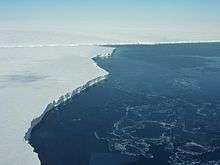Getz Ice Shelf
The Getz Ice Shelf is the largest Antarctic ice shelf along the SE Pacific-Antarctic coastline, over 300 miles (500 km) long and from 20 to 60 miles (30 to 100 km) wide, bordering the Hobbs and Bakutis Coasts of Marie Byrd Land between the McDonald Heights and Martin Peninsula. Several large islands are partially or wholly embedded in the ice shelf, pinning the calving front.

Summer temperature and salinity measurements from 1994 to 2010 show the shelf is subject to more changeable oceanic forcing than other Antarctic shelves. Beneath cold surface waters, the thermocline was ∼200 m shallower in 2007 than in 2000, indicative of shifting access of deep water to the continental shelf and ice shelf base. The calculated area-average basal melt rates was between 1.1 and 4.1 m of ice per year, making Getz the largest source of meltwater to the Southern Ocean.[1]
The ice shelf westward of Siple Island was discovered by the United States Antarctic Service (USAS) in December 1940. The portion eastward of Siple Island was first delineated from air photos taken by U.S. Navy Operation Highjump, 1946–47. The entire feature was mapped by the United States Geological Survey from U.S. Navy air photos of 1962–65. It was named by the USAS (1939–41) for George F. Getz of Chicago, Illinois, who helped furnish the seaplane for the expedition.[2]
Further reading
References
- Jacobs, S. (2013). "[https://agupubs.onlinelibrary.wiley.com/doi/epdf/10.1002/jgrc.20298 Getz Ice Shelf melting response to changes in ocean forcing]" (PDF). Journal of Geophysical Research: Oceans. 118 (9): 4152–4168. doi:10.1002/jgrc.20298. eISSN 2169-9291. External link in
|title=(help) - "Getz Ice Shelf". Geographic Names Information System. United States Geological Survey. Retrieved 2012-04-23.
![]()